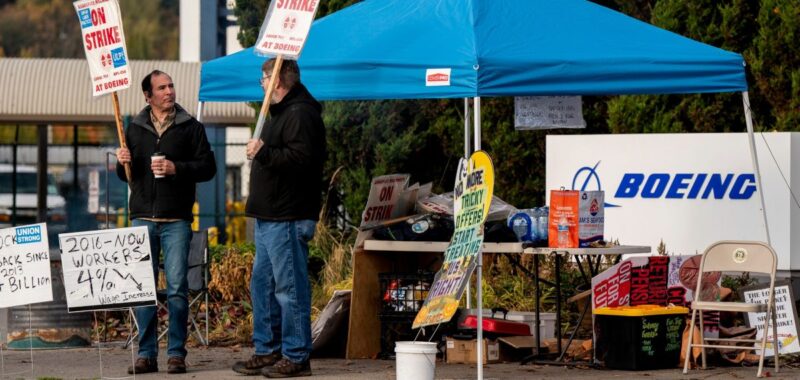
A bad day for Boeing was supposed to get better Wednesday night. It didn’t as over 32,000 striking factory workers rejected Boeing’s latest contract offer hours after the struggling aerospace giant posted a $6 billion loss for the quarter. With production at Boeing’s facilities in the Pacific Northwest ground to a halt, the company’s leverage appears minimal.
The strike is taking a toll on the aerospace industry and broader economy. Last week, the latest estimates from Anderson Economic Group put the total economic losses from the strike at $7.6 billion, with that number set to surge above $8 billion this week. As of last week, Boeing workers and shareholders are out at least $5 billion, according to the estimates, with Boeing’s suppliers taking a roughly $1.8 billion hit.
“The cost of the strike in the fifth week was much larger than in the first week, and had spread beyond the striking workers at Boeing to many of its managers and engineers, its suppliers, and to other businesses in the Seattle area,” Patrick L. Anderson, the firm’s CEO, wrote in an email to Fortune.
Boeing’s stock declined just over 1.5% Thursday morning and is down 38% this year, which began with a panel of one its 737 Max planes famously blowing off during an Alaska Airlines flight in January. Shares have dropped roughly 65% from an all-time high of $440.62 in March 2019.
Over two decades of leadership missteps have eroded trust in the company from shareholders, customers, regulators, and workers alike, something new CEO Kelly Ortberg acknowledged on the company’s earnings call Wednesday.
“We’re saddled with too much debt,” he said. “We’ve had serious lapses in our performance across the company, which has disappointed many of our customers.”
With the company set to burn cash through at least 2025, the company can’t start making planes again soon enough. The strike has completely halted production of several aircraft, including its 737 jets. Boeing’s commercial business has been hammered, accounting for a quarterly operating loss of $4 billion.
The company’s problems are not just related to the strike, however. The space and defense business, which is unaffected by work stoppage, took a $2.4 billion loss.
Ortberg warned investors on Wednesday that a turnaround will take time, even when the striking machinists do return.
“It’s much harder to turn this on than it is to turn it off,” he said. “It is so much more important that we do this right than fast. I’m anticipating we’ll have a bumpy return.”
Boeing workers want 40% pay hike, pensions
First, however, it’s back to the negotiating table. Many analysts expressed optimism about Wednesday’s vote after union reps and Boeing came together with the help of acting U.S. labor secretary Julie Su.
The contract included a 35% wage hike, up from Boeing’s initial offer of 25% and the company’s supposedly “best and final” offer of 30% last month, and would have bolstered Boeing’s 401(k) contributions.
The agreement, however, was voted down by 64% of union members, who have called for a 40% wage hike after years in which they say their pay increases have lagged well behind the rising costs of living in the Pacific Northwest.
“There are consequences when a company mistreats its workers year after year,” Jon Holden, the president of the International Association of Machinists and Aerospace Workers District 751, said in a statement announcing the vote.
Union members are also adamant about restoring a defined benefit pension plan, which they lost a decade ago after Boeing threatened to build its 777X jet at a nonunion plant. So far, Boeing has not obliged.

